Transcription:
Robert Bateman:
Hello. And welcome to FinCrime Focus, anti money laundering. Thanks so much for joining us. My name is Robert Bateman. I’m the head of content here at GRC World Forums. And I’ll be your host for the first part of today. Over the next seven hours, we’ll be bringing you opinion analysis and debate delivered by carefully curated subject matter experts in AML. We’ll be looking at the issues at the forefront of AML, from managing your compliance program, understanding the latest regulations and improving the effectiveness and efficiency of your AML efforts.
Make sure you view the agenda and register for sessions via the left hand menu. You can register for sessions even if you are not attending live so you can get them on demand later. You can also view our sponsors pages to learn more about them and view the resources that we have available for you. I’d like to say a big thank you to our sponsor for today, BioCatch, who will be presenting a fascinating talk on how behavior is solving a growing money mules problem at 12 o’clock UK time. So, make sure you listen to that.
And before we get started, I just wanted to let you know about some other events organized by GRC World Forums across the rest of the year. ThinkCrime World Forum will feature as part of our digital trust Europe series. This is a series of in-person events, focusing on financial crime and other important topics like data protection, ESG and cloud modernization. Upcoming dates include London on the 7th and 8th of June, Dublin on the 28th and 29th of June and Amsterdam on the 6th and 7th of July.
At the Excel London on the 16th and 17th of November, we are running an exhibition called hashtag risk, which will feature among other things, a finance theater dedicated to bringing together the top speakers in this space. So, for more information on those and lots of other events, we have coming up, check out the GRC World Forums website. So, let’s get into our first session of today, getting to grips with the complex web of financial crime. For this, I’ll be handing over to our host for this session. Nicky Gomez, who is a partner at XReg Consulting. Nicki over to you.
Nicky Gomez:
Hi Robert. Thank you very much for the introduction. Hi, my name is Nicky Gomez and I am a partner at a boutique regulatory consultancy firm called XReg Consulting, which was started about two and a half years ago. At XReg, we specialize in crypto assets and AML CFT. So, solutions. So, even though we focus predominantly on crypto assets firms, we also work with other types of financial institutions predominantly in helping them implement effective risk-based solutions in order to help firms comply with their regulatory obligations but also ensuring that they are tailored to the risks that the particular firm is exposed to.
At XRay, we work both with the private and with the public sector. So, we work with governments. We work with regulators and we help them develop sound policy, develop legislation for crypto assets, for virtual assets as there are known in many parts of the world. And we also work with the private sector. We got clients established all over the world and we provide strategic regulatory advice. And again, we help them develop lean proportionate compliance controls. Today in this session with me, I’ve got Hemanshu Parekh, who is a director financial crimes compliance at Standard Chartered. Hi Hemanshu. Thank you very much for joining me. And you would like to do a quick introduction?
Hemanshu Parekh:
Sure. Thanks Nicky. So, my name Hemanshu. I’m a charter accountant, a lawyer and MBA by qualification and exam. Basically started as an internal auditor. And then last 15, 16 years have been into AML. Investigation is my forte. I love doing that. And in that way, while being on roll off a financial institution, I try to solve the society as well. So, I have had an experience of what I believe to be cracking several different sectors investigations. I believe it to be a [inaudible 00:05:56]. I’m not sure once we file it with the regulators, we never hear back except in sometimes where we get to read about it in the newspapers after a few years. So, yeah. I absolutely love what I do and I’m excited about it and get to share a few things that I have learnt and learn new things as well. Thanks Nicky.
Nicky Gomez:
Perfect Hemanshu. Thank you very much and I look forward to sharing the panel with you here today. Also in the panel with us today is Richard Parlour. Richard is CEO of Financial Markets Low International. Hi Richard. Nice to have you on board. And-
Richard Parlour:
Thank you very much.
Nicky Gomez:
Quick intro.
Richard Parlour:
Yeah. Sure. I suppose in essence, the legal equivalent of Hemanshu by which I mean, that my background is as a lawyer rather than an accountant. But similar stuff. So, I’ve been working with anti-money laundering since the days of the first EU anti-money laundering directed. And have been on the HM Treasury Money Laundering experts group. Currently, my big role, I suppose, is as [inaudible 00:07:08] of the EU taskforce, looking at how you improve AML effectiveness across Europe, so.
But it’s not just policy stuff. I mean, like Hemanshu, I like doing investigations as well. We’ve covered about 140 countries worldwide in investigations that we’ve carried out today for pretty much all sorts of financial institution. We work very closely with law enforcement in a number of different countries as well. And we are moving over to.. We can get a big sea change happen in AML, where we move towards something called anti Terra side financing, which is basically joining up the dots between the global financial crime agenda and the climate and related agendas.
Nicky Gomez:
Excellent. Thank you very much, Richard. And I’m sure that we will get loads of really interesting insights from our session today. So, the session today is as Robert mentioned, it’s about getting to grips with the complex web of financial crime. So, the modern financial crime landscape is complex international and evolving. And in this session, we will… With an overview of the current state of financial crime. And then we’re going to consider where AML fits into the whole scheme of things.
So, maybe before we go into the questions, just to set the backdrop on which I think we will be basing a lot of our discussion today set the scene, although it’s very difficult to actually measure. But the global scale of financial crime today is estimated to cost the world in excess of 2 trillion a year, which is a huge amount of money just in the UK. According to the national crime agency, serious and organized crime cost are UK an estimated $50.4 billion a year, which I think helps put things into perspective in terms of the scale of the problem.
And then when we talk about financial crime, again, just to… But financial crime can range from something extremely basic and like a theft or a fraud committed by a single individual as they one off or as a series of events. But it can also be large scale complex international in nature and masterminded by very well organized criminal organizations. The impact of serious criminal activities should not be under underestimated. Beyond their social and economic impact they often are closely linked to very violent crimes, human trafficking and even terrorism.
So, these things can be very serious. And one of the biggest issues I think is that for those carrying out the crimes, the risks are arguably relatively low with limited persecution and conviction. However, the returns, especially for those at the top end of the food chain are huge. Financial crimes are undoubtedly becoming increasingly complex. As criminal organizations become most sophisticated, the crimes are becoming, as we mentioned before, increasingly international and cross border in nature, which makes it harder for law enforcement companies to detect.
Advances in technology has made the world increasingly digital. Financial transactions today happen mostly in digital form. And yes. This has delivered many benefits, which includes an increase in financial inclusion, cheaper and more accessible financial services to name but a few. But it has also created new opportunities for criminals, new ways to loan the funds, et cetera. So, with that in mind, my first question to you both is what trends in your respective areas, what trends have you seen in terms of the evolution of financial crime? If I go to you first, Richard?
Richard Parlour:
Yeah. Well, I think probably the biggest trend over recent years has been, as you indicated, the digital dimension. And in terms of crime, that means cyber crime. So, cyber crime has lept up through the ranks and is now one of the world’s top five leading crimes. So, that’s been a major development. One of the other major developments in terms of the tops of five crimes worldwide has been the sudden realization and emergence of illegal wildlife trafficking. When I mention that to people, a lot of people say, “I can’t possibly be that big in a top five category. But yes it is.” And we need to focus much more on that. Not least just to try and help with the global biodiversity and biomass problem that we’ve got for the planet at the moment. So, those would be my two key changes immediately.
→SEE ALSO: FinCrime World Forum
Part of the Digital Trust Europe Series - will take place through May, June & July 2022, visiting five major cities;
Brussels | Stockholm | London | Dublin | Amsterdam
Get to the edge of the financial crime debate at FinCrime World Forum.
Nicky Gomez:
And maybe I know it might sound… Maybe for those less familiar with wildlife trafficking, what things are we seeing at the moment?
Richard Parlour:
All sorts. So, I think most people will have come across trafficking of rhinos for rhino horn. There was an attempt to stop that by pointing out firstly, that rhino horn is exactly the same chemically as your fingernails. So, why do you think that this gives you a sudden amount of potency? And then the next thing was to try and manufacture some rhino horn, which could be traded. But then of course, the buyers got a bit suspicious about that and then demanded to see the rhino horn itself complete with blood still trickling down the horn.
So, real difficulties when you are trying to stop for trade like that. I think the world’s most trafficked animal is actually the pangolin. Is absolutely cute little animal. But it’s not just about animals being trafficked from Africa into Asia to… For certain social reasons but also many many other animals being trafficked into say North America because people like having exotic pets, that kind of thing. So, there’s a huge, huge trade in this and certain big hubs. So, Iraq for example, is a very large help for this kind of trafficking. And if you’re wondering about what the other three are in terms of global serious crimes, then they are illegal drug trafficking, which has obviously been around for quite a while, arms trafficking and people trafficking/people smuggling.
Nicky Gomez:
Okay. Perfect. Richard, very insightful. How about you Hemanshu? What would-
Hemanshu Parekh:
Thanks. Oh, yeah. Oh, thanks for asking. Before I share my views, I’m just a person and whatever I say do not represent my organization views, just my personal views through my daily experiences, life of work and as a consumer of data, media, et cetera. So, I agree with Richard, illegal wildlife trafficking. And you asked Nicky how it all started. 20, 30 years back, nobody in Asia consumed rhino horns. The only country that imported rhino horns was Yemen because they used the rhino horns as a cover or a holder for the knife., dagger. And then a particular politician in a nation country holded a lot of rhino horn and held a press conference to declare that his mother was cured of a certain ailment due to consumption of the rhino horn.
And this started the consumption. And rhinos go for as high as $60,000 a kilo, which is, which is very, very high. And they don’t realize that it grows back as Richard mentioned like nail. And the poachers actually still kill it rather than just harvesting it. The ivory on the other hand, they don’t realize that it doesn’t grow back and several tons of fibers gets wasted and the animals get killed. Pangolins on the other hand, just to increase the weight of the meat of tangling, they feed the Pangolin flour or sometimes even cement.
So, as to have… So, besides the data and analysis, we also need to look at it from compassion and empathy point of view because they are our fellow species in this world. Human trafficking, which I mentioned. What I particularly see happening in current ages that earlier the criminal had only bank as the first touch point. Now there are several other touchpoint, crypto assets or MSBs or payment processes, e-commerce. They can route their money or goods through several other channels.
And sometimes bank is the second or the third touch point, sometimes not even that much. So, that has changed. Banks do not have the monopoly on it anymore. And the advent of pandemic has leaped the development into technology, communication. The financial institutions have also evolved. The onboarding policies have become easier. The limitation of space and time no longer apply to banking, investing and shopping. So, that while the technology and communication and consumption is very fast, the regulations and the control still take time to pace up. So, that’s what I see in the current time here,.
Nicky Gomez:
Okay. Perfect. And that’s the something in terms of the controls that firms can implement to help detect and including the use of technology is definitely something that I would like to cover in a session today. But we’ve got a question that’s coming, which is regarding wildlife trafficking that I wanted to put to you both. So, regarding wildlife trafficking trading, what steps can be taken to prevent this with a use of technology. So, again, that’s more going in terms of is there anything within technology that can be leveraged in order to help detect
Hemanshu Parekh:
Yeah. Richard, you’ll go first?
Nicky Gomez:
[crosstalk 00:18:09]. Yeah.
Richard Parlour:
Yeah. I mean, absolutely. I mean, when you are out on the front line, two things immediately spring to mind. One is drones. Drone technology is coming on so fast and it’s not just the largest drones but the nano drones are just extraordinary. So, you can get them down to the size of a dragonfly. So, there’s massive capability to actually go out and watch what’s going on. There is also the capability technologically to work out where people are because virtually everybody is running around with a mobile phone these days. Otherwise known as a tracking device. If you’ve got your geolocational data on it.
And then there are other great technologies coming out. So, I’m involved with a company which is involved in gunshot detection. And we’ve developed something which you can put on your phone and we’ll tell what kind of weapon is being used, how far away it is, you can shove it into another app, which has got mapping in it. So, you can work out where the shooter is and track them down pretty quickly. So, yeah. Early days for that gunshot detection technology but shows absolutely fantastic use for the future.
And of course that is going to be quite a strain because if you look at population predictions until the end of the century, certain countries are thoughts to be about to go into severe population decline. We are already seeing that in countries like Russia but we’ll also see it in countries like Spain and China, for example, both of which, they’re like to see their populations have. But at the same time, a lot of countries in Africa are likely to see their populations that the current predictions increase by a factor of four. So, of course that’s going to place very large strain on the wildlife population in Africa.
No. Not just in Africa. I don’t want to sing the single then out. But also in Asia, in particular and South America. But more generally, we all need to be on the watch out for that. Because in biodiversity terms, since the 1970s, on average, we’ve lost about 70% of our wildlife populations and an awful lot of wildlife species are under threat of extinction. And that’s not just in other countries that particularly true in developed countries like the UK, for example, where you look at the biomass of the UK and 75% of that is basically domesticated.
So, it’s all the chickens we eat and the cows and all the other sort of forms and all the pheasants that we shoot. So, there’s not an awful lot of wildlife left in countries like the UK. Much more in other countries and we obviously need to protect those as much as possible, not least because it’s thought that there are numbers of strains of new viruses, which will come out. If we get too close to wildlife, particularly from bats we’ll pose a huge threat to human health. And we’ve obviously seen that with COVID 19 but there quite possibly will be many more types of COVID coming through.
Nicky Gomez:
Hemanshu, maybe a question wanted to turn to you, what do you… Now that we’ve discussed talked about some of the trends that we are seeing with regard to the evolution of financial crime, what would you say is one of the biggest challenges for financial institutions such as banks, for example, in terms of one trying to keep up to date with the evolution of financial crime, try and keep one step ahead to ensure that the controls that you have in place in order to mitigate the risk are actually effective.
Hemanshu Parekh:
Sure. So, the biggest challenge for financial institutions in today’s world, I believe is data availability, accessibility and usability of data. Some data is not available to banks. They don’t capture it. Some data is available but not used or not accessed by the department that investigates for example. So, these three factors, availability, accessibility and usability of data is crucial for banks.
The good news is that if banks start doing it, banks start using the data, which is it’s also unknown to use. It’ll be useful. And the good news is that the tech giants have already proven the usability of the new data points. The tech chance, the world giants of Google, Amazon, Alibaba, they have proven it that this data is not only available but can be useful in finding our financial crime. The bad news is that even if banks decide to use it, they’re already late in the race. They will be competing with the tech who are already much, much ahead. So, capability, willingness, finances, speed, all that will become a challenge once data problem is resolved to be solved. Yeah.
Richard Parlour:
I would agree with Hemanshu that data is a significant issue. I would give you a slightly different spin on it because I think the biggest problem with data is the analysis of it. And prior to the analysis setting, what exactly it is that we’re trying to achieve. So, if you read the taskforce reports, which we’ve produced, one of the elements of that is on risk. And what we are saying is that we’ve lost sight of the overall aims of AML. And we need to refocus that. How do we refocus that? And there’s a bit of talk in some financial institutions about the KPIs that they’re using. But a lot of the KPIs are completely and utterly useless.
And if you ask people about what KPIs they’re using, so their top one is quite often how many suspicious activity reports we have made. Well, thank you very much but that doesn’t really get us any further down the track. So, what we are trying to say is, right? What we want you to do is to have a look at the aims, what are we trying to achieve? We’re trying to decrease levels of people dying from illegal drugs and the overdoses and stuff. We’re trying to have an impact on the scores of drug trafficking on illegal wildlife trafficking with arms trafficking, which is rampant at the moment and getting far, far worse.
So, how do we do this? Well, before you set KPIs, can you please set OKRs. OKRs are objectives and key results. So, where are we trying to get to from where we are now and what are going to be the results along the way so that you can measure your progress towards that objective. If you set KPIs before you do that, you are going in completely the wrong direction potentially. And the reason I say that is because OKRs are measures of effectiveness but not efficiency and KPIs are measures of efficiency but not effectiveness.
So, if you are setting efficiency measures before you’ve set effectiveness measures, you could just accelerate the demise of the overall effort to the wrong end. So, please, please, please, all financial institutions listening, if there’s one thing that you take away from this talk… And I love seeing people take action afterwards. And if you want to come back to me finally on LinkedIn or something and we can have a discussion. But please do set those or think at least about what those should be so that we can reduce the scores of these just dreadful crimes and the appalling impact that they’re having on our planet.
Nicky Gomez:
Yeah. And I… Maybe looking from a slightly different perspective but I think saying ultimately the same thing, one of the things that I think has largely happened is that AML compliance has become to a large extent, a tick box exercise where people are doing things because it’s what’s done, because it’s what other firms do, it’s because what they might have been advised to do without really thinking in terms of what the overall objective is. What is it that you are trying to achieve? Why are you spending so much money and implementing these controls? And ultimately, what you’re trying to do is stop these crimes from happening. You’re trying to mitigate money laundering and terrorist financing risks.
So, my advice is always at the starting point is do a proper business risk assessment and not just the business risk assessment and exercise that you do. And then you forget about it for the rest. Do a proper… Really spend best time in understanding your business, understanding what you do, understanding the products and services, understanding the threats to which you’re exposed, what are the vulnerabilities inherent in your business. And then you use that to drive and to prioritize where you want to implement your controls, your measures, et cetera. And I totally agree with you Richard, in terms of reevaluating the effectiveness of the controls you put in place.
If something doesn’t work look for better ways of doing it, which I think brings you quite one of the things that I wanted to ask you both not understanding that the global spend on financial crime compliance and again by financial institutions is estimated to be in excess of $200 billion. Again, a huge sum of money yet the estimated global success rate at least of money, laundry control… So, the effectiveness is estimated to be below 1%. So, a minimum amount. So, I think it’s fair to say largely ineffective. So, with that in mind, what do you think could be done in order to improve the way we approach financial crime risks?
Richard Parlour:
Well, I guess I’m tempted to say, read our report. There’s an awful lot in. But we just quickly summarized it. We approached it in terms of GRC. So, governance and you’ll have already seen some steps forward there. So, much more coordination across the example. That’s a very good step forward. A very bad step backwards has been Brexit because that’s severed quite a few of the information exchanges. So, we need to try and find a way around the Brexit issue to make sure that UK is properly tied into that and we can help. And we can also be given data much more freely as used to happen pre Brexit.
So, that’s one element R is our risk management. So, that’s the OKRs and the KPIs and getting them in the right way round. And looking at that… And C. C for us is actually capability. So, we’re looking at the numbers of people that you’ve got and how they’ve been trained and what they’ve been trained to do. And there we’ve got another big issue because the system is pretty much broken and governments have been trying to save money on this, basically by putting the burden onto the private sector.
And the private sector has been told, you’ve got to detect AML. Well, there isn’t much detection capability within financial institutions. Financial institutions are there to make the financial system work properly. They’re not trained in detection. At the same time we’ve seen a lot of detectives in law enforcement about half of them, their positions have been acted by various governments over the over recent years. And then we have a whole load of appallingly bad technology coming in with useless algorithms, which in some financial issues that meant you’ve got thousands of people who are just looking at false positives, which means spa out by an incompetent algorithm or a badly focused one.
And if you’ve got something like 5,000 staff in some of these banks who are just sitting there looking at false positives, well, 5,000 people, that’s bigger than the whole of Euro poll staff. That’s bigger than the city of London, which is our financial police, if you like. So, it is not just about fixing it within the financial institution. But the financial institution’s getting a bit more alive to what’s happening at country level and international level and putting pressure on them and saying, “Well, look, yeah. We are very prepared as you know to help out.” But for goodness sake, let’s get the system sorted first, will we?
Nicky Gomez:
Yeah.
Richard Parlour:
And it’s really depressing. On the one hand, you get some great measures coming out of the open commission and then you talk to them about what their measures of success are going to be. And their measures of success are going to be how many states have implemented the changes? Well, it shouldn’t be that. It should be what is the impact on the underlying crime? And I know it’s difficult. But there are ways of doing that. There’s something called dark number theory. But we haven’t notice really spent any time looking at dark number theory and applying that in a technological sense for the last few decades. So, if anybody’s listening and wants to do a PhD, there’s a huge numbers of research titles I can give you.
Nicky Gomez:
[inaudible 00:32:56] very interesting. How about you Hemanshu? What’s your take? How do you think we can become more effective at combating financial crime. And maybe one of the things we mentioned before we spoke about how financial services generally has become increasively digital. We have touched upon technology. Do you think there’s something inherent in technology itself that can help us become better at more effective it’s combating financial crime.
Hemanshu Parekh:
Oh, sure. I’ll provide you mine. But you mentioned that the success rate of the current data controls tend to be less than 1%. So, do we need a replacement? So, my take is I give you a metaphorical example. In school, all of us learned trigonometry but less than 1% of us applied in real life. So, shall the school do away with teaching trigonometry? I guess not. We shall still continue. A similar thing applies for AML solutions as well, because they tend to be covering a whole of hundreds of predicate crimes. And because they look at hundreds of crimes, they’re not focused.
So, it is by design. But it may not be the ideal design but doing away with it may not be ideal too. Probably we can think of something like what we have in school again, co-curricular activities. Along with trigonometry, we have co-curricular activities. So, along with the automated solution, we may have targeted monitoring, whereby we choose a particular crime, study the red flags, try to digitize the parameters which are available in the transaction and then try to look for those parameters, which are hitting our real transaction.
And then we are probably solve that particular crime. So, probably I saw say human trafficking, that particular model does nothing for illegal wildlife trafficking. It’s okay. Then another model will be good for illegal wildlife trafficking but won’t apply to money use. And another one,we apply to shell companies and not money use. So, we can have different models. But regulators still expect banks to be all encompassing and regulators will look to bank for answers and that will still require a formal system. And another targeted system may be a good solution. Yeah. That’s my take.
Richard Parlour:
Yeah. I’d agree with on that. There’s a very good intelligence analysis technique when you’ve got a huge problem. It’s called morph analysis. And essentially what you do is you have a look at the problem, you break it down into its constituent parts. You look at the constituent parts, trying to work out what the solutions for the constituents would be. Then you do a proper risk assessment and then you’ll find some kingpin risk solutions there. And you focus on the kingpins because the kingpin steps that you can take will solve more than one. So, that would be my thing on that. Can I just… I saw question two that’s-
Nicky Gomez:
Yeah. Yeah. I was going to go through a lot to go questions now. You-
Richard Parlour:
Okay. I can answer that very quickly. And let’s have a look at MICA, which whoever asked that. MICA is the Markets in Crypto-assets Regulation, which is very recently come out buy it from Europe. This is the leading regulation or attempted regulation of crypto worldwide. So, if… I know people don’t have much time to look at this kind of stuff but MICA is definitely the leading area of that.
Nicky Gomez:
So, just I’m not too sure if the viewers can see. So, just in case, I’ll read out the questions. So, the question was, do you think we need a separate regulation for crypto assets instead of adopting just standard AML KYC model? So, maybe to add to Richard’s point, this is… So, if you… Do I think the existing AML CFT standards work for crypto? The reality is that over the last few years, that’s exactly what’s been happening. We’re applying standard AML CFT controls based on the fact of standards to crypto assets.
But if you take a little bit of a step back, crypto assets, where if you look at the Bitcoin, as an example. Bitcoin was designed to be a peer to peer network. So, allow individuals to transact, to exchange value directly with one another without the need for a trusted intermediaries. What has happened is that with time, new intermediaries have remotes in order to be able to facilitate and to allow the general public to be able to transact using cryptocurrency. So, we’ve seen the introduction of crypto exchanges, crypto custodians, that help individuals manage, store their crypto assets securely.
This evolution of new intermediaries around crypto has allowed for the application of standard AML CFT practices. Because if you look at the way that AML CFT exists today, there’s a reliance on a central authority. There’s a reliance on an institution that will be held accountable for applying the rules, applying the standards. So, naturally the way that AML has evolved to date facilitated by the creation of these intermediaries is that the same standards have been applied. Is it effective? In my view, generally, I would say in the same way as it isn’t in traditional financial services, we just covered the billions of dollars that are spent, pounds that are spent in converting money laundry financing with in reality little effect.
One of the things that’s definitely going to challenge this is the one the last few years, we’ve seen a trend towards decentralized finance. And in effect, decentralized finance basically is the provision of standard financial services, whether it’s exchange services, it’s lending and borrowing, it could be insurance without the need for a trusted intermediary. So, in effective relies on blockchain technology and the use of what known as smart contracts to facilitate and execute trades automatically.
The issue with decentralized finance is that there is in many instances, there is not a single identifiable entity that has control over the platform and that facilitates the operation of this platform. So, it’s very difficult to identify who should be held accountable for the application of AML. And as decentralized finances evolves in my view so does the need to come up with a difference, a better and a more effective way of converting man laundry and terrorist financing?
I don’t know what the solution is but I do know that the only way we’re going to find a truly effective solution, which is going to be effective at managing the risk but also is going to be commercially viable for institutions or for the people that have to apply it is by getting together setting standard settings, where it’s individual form and other organizations, regulators, law enforcements, advisors and industry working together to come with the solution. [inaudible 00:41:00]. I don’t know if you guys have [inaudible 00:41:04] to add to that?
Richard Parlour:
Yeah. No. There’s lots of elements in the crypto space. And one of the more interesting ones I suppose, is also looking at what’s happening with law enforcement. So, law enforcement have made some pretty good steps on following crypto. You’ll have seen that the FBI, for example and Europol have taken quite a few steps to successfully inter AML done through crypto. City of London police last year, I think, see something like about 300 million running through various other cryptocurrencies. It’s not just Bitcoin, there are something like about 6,000 of these Bitcoin lookalikes currently in issue and the numbers growing day by day.
And they’re not all the same either. So, a lot of them have got some different security elements in built into them. And of course, those are the ones which are probably worth looking at in a bit more detail. But the FBI and various other organizations have just… And a DOJ for example have just launched a special crypto crime units. And some of these offices are pretty switched on to be honest. So, yeah. Not as many as they probably need at the moment but they’re growing and they’re catching up. So, you’re not guaranteed to get away with it just because you’re using crypto.
Nicky Gomez:
Yeah. And one of the key… So, I don’t know why [inaudible 00:42:45]. I can’t get rid of it. But one of the key things with technology [inaudible 00:42:57] transactions are published in most cases. So, there are many companies that have developed tools to help with these investigations. You can actually follow trail funds on the [inaudible 00:43:12]. I think we’ve only a few minutes left. I don’t know whether want to maybe ask-
Richard Parlour:
There’s a question. Question four, which was another one on wildlife, which organizations are actively looking to stop this is on a national level with governments and police. Well, yes. There’s quite a bit happening at national level, not just in the UK but in other countries as well. There are an awful lot of NGOs, non governmental organizations around the world which are focused on either wildlife issues in general, like wildlife fund, the WWF or focus on certain animals. There’s one, for example, focus just on giraffes, that kind of thing.
So, there are lots and lots of organizations around there, which are trying to improve matters. I’m putting all this together in a book at the moment and that would be released later in the year, a book on anti Terra side financing. And that will have an appendix in there, have a lot of the organizations and certainly the key ones which have been doing research in this area so that we can all put what we’ve been doing and our expenses into that.
So, I can develop that into a second edition. It is a vast, vast subject. We need to keep talking and develop things pretty quickly. So, there’s almost a going to be like a Wiki kind of book as it were. But I need to get the first one out to in a bit more detail what I’m talking about. But then I’m hoping I get a bit of audience participation so we can get to a more comprehensive and more impactful follow-up additional that. So, watch this space.
Nicky Gomez:
There’s a question here about [inaudible 00:45:10] the word for you Hemanshu, given the impact of COVID-19 on the increase of financial crime, to what degree have relationships building and partnerships evolve in addressing financial price. Hemanshu, maybe one for you, would you-
Hemanshu Parekh:
Question number three. [inaudible 00:45:20] financial crimes. [inaudible 00:45:21]. To what degree is the relationship building and partnership involved addressing in addressing funds? Okay. Okay. So, I can stitch it back to the wildlife question along with answering this question that no amount of technology will be successful unless we have people. And same for wildlife and several different not only financial organization need to [inaudible 00:46:16] but several other sectors items like logistics, shipping, [inaudible 00:46:22], freight forwarders, distributors of wildlife product.
And besides the source and destination countries, government customers. So, that cooperation is essential in all financial clients but mainly in wildlife. Earlier, Richard mentioned about wildlife being exported to us North America. If wildlife trafficking is about $20 billion, then more than 80, 90% of it is because of [temperature 00:47:06] or roads. And a lot of it goes to Europe. So, different parts of the world has different types of wildlife or environmental product. So, that cooperation is essential or to score a success against crime. Yeah.
Robert Bateman:
Hi everyone. Something going on with the sound that unfortunately is quite difficult to hear but we are clearing the end of the session now anyway. So, I’ll wrap up there if that’s okay. Really great chat until the sound started going wrong. So, apologies to the audience for that. We’ll have to investigate that. Particularly interesting discussion there on the importance of data and its availability for transaction monitoring purposes. Be interesting to see how the UK navigates that I think with the diversions from the EU. So, that’s the end of our first session today. We’ll be back in.
FinCrime World Forum
Part of the Digital Trust Europe Series - will take place through May, June & July 2022, visiting five major cities;
Brussels | Stockholm | London | Dublin | Amsterdam
Get to the edge of the financial crime debate at FinCrime World Forum.
FinCrime World Forum is a two-day in-person event taking place as part of the Digital Trust Europe series. The event will feature presentations and panels from thought-leaders and anti-financial crime professionals that are leading the way on how we can better, more efficiently and more effectively fight financial crime.
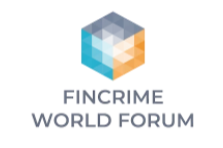
Getting to Grips With The Complex Web of Financial Crime

The modern financial crime landscape is complex, international and evolving.
 Currently
reading
Currently
reading
Getting to Grips With The Complex Web of Financial Crime
- 2
- 3








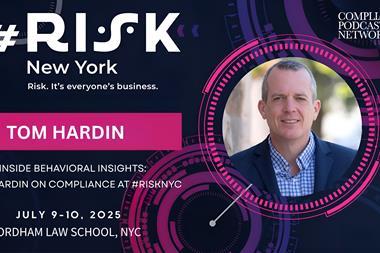

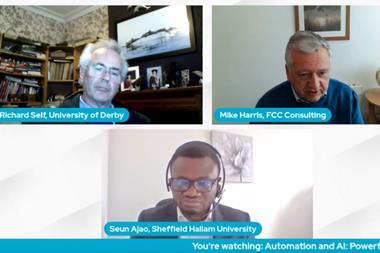
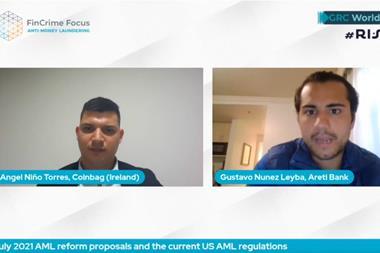
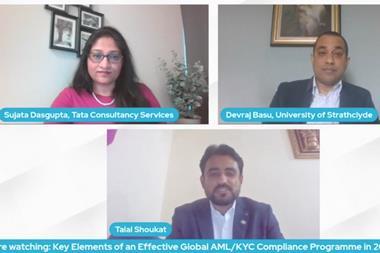


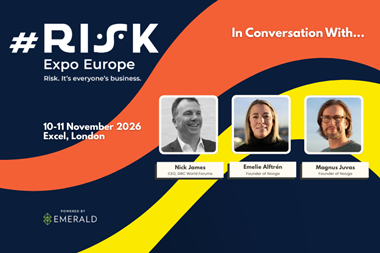




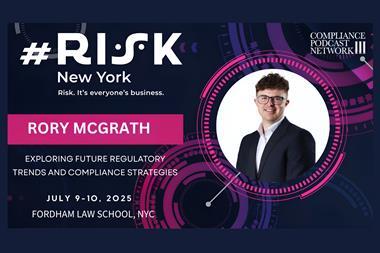







No comments yet